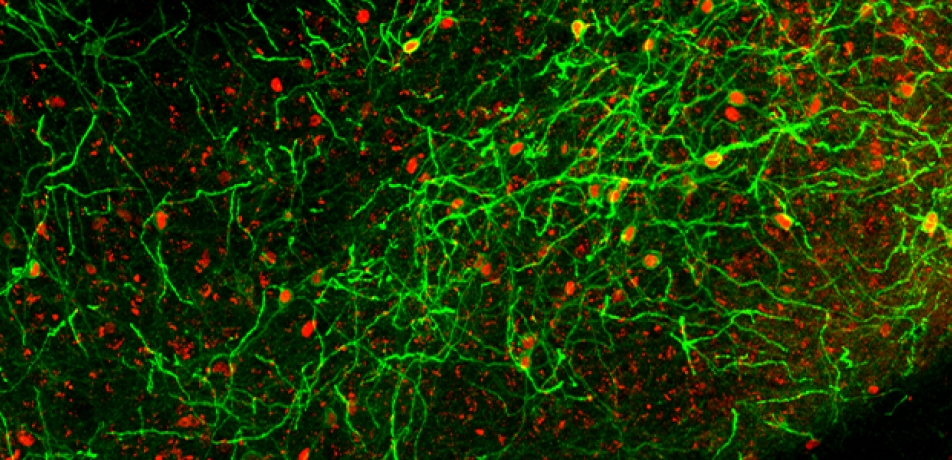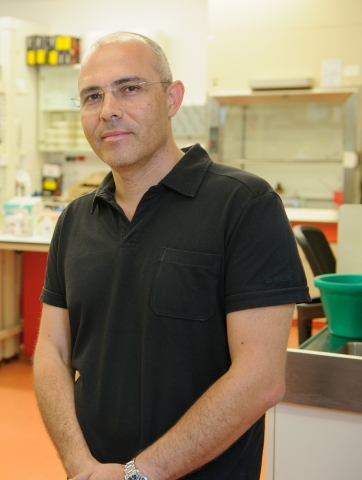Stress in the brain
Briefs

Two recent studies by Prof. Alon Chen, head of the Department of Neurobiology, have shown how the management of stress is built into our brains.
A “switch” for social stress
As reported recently in Nature Neuroscience, Prof. Chen showed how people who make friends easily may be hard-wired to do so, thanks to a neural mechanism that—when switched on—regulates one’s ability to cope with social challenges.
The mechanism involves a small signaling molecule called Urocortin-3, and a receptor on the surface of neurons to which Urocortin-3 binds. Drs. Yair Shemesh and Oren Forkosh - both members of Prof. Chen’s lab - found that varying levels of Urocortin-3 may help determine how willing we are to leave the safety of our social group and strike up new relationships.
The researchers devised a “social maze” for mice that allowed them to choose whether to interact with familiar mice or with strangers, or to avoid social contact altogether. They also designed a special arena in which group interactions could be tracked with video cameras.
Prof. Alon’s team demonstrated how mice with high levels of Urocortin-3 in the brain actively sought out contacts with new, unfamiliar mice. But when this receptor was blocked, the mice chose to socialize mainly within the most familiar group, and to avoid strangers.This stress-regulation mechanism may impart an evolutionary advantage, says Prof. Chen, stimulating social contact within trusted groups, while promoting caution with intruders. And, he adds, what’s true of mice may be true of men.
“Since an analogous system operates in the human brain, our findings suggest that this mechanism might be responsible for coping with social stress,” he says. “Disruption of this mechanism may be implicated in social anxiety, as well as more serious behavioral disorders.”
Food-related stress: hard-wired in women?
Research suggests that of those struggling with serious eating disorders such as anorexia and bulimia, only about 10 percent are male. While many blame cultural messages that strongly link female thinness with social acceptability, this gender discrepancy may be based, at least in part, on differences between the male and female brain.
A study by Dr. Yael Kuperman, a staff scientist in the Department of Veterinary Resources has demonstrated a critical difference in how the male and female brains react to stressful situations. Working with graduate student Meira Weiss, Dr. Kuperman began this study while still a doctoral student in Prof. Chen’s lab.
The team discovered that, in about half the neurons known to be involved in the arousal of appetite, a receptor called CRFR1 mediates the body’s stress response. To investigate the exact role of CRFR1, the researchers created a mouse model in which this receptor was removed specifically from these appetiteassociated cells. The mice were then monitored for their response to stressful stimuli, including the withholding of food. When the mice were exposed to stressful stimuli, the female CRFR1-deficient mice displayed a dramatic reaction—the level of glucose produced by their livers dropped significantly - while the male mice were barely affected.
The findings show that male and female bodies exhibit significant differences in their metabolic response to stressful challenges. They may also help explain why women are much more prone to eating disorders than men - a discovery that could lead to the development of drugs that mediate behaviors associated with eating disorders.
Prof. Alon Chen is funded by Adelis Foundation, The Candice Appleton Family Trust, Irving Bieber, M.D. and Toby Bieber, M.D. Memorial Research Fund, The Henry Chanoch Krenter Institute for Biomedical Imaging and Genomics, Mr. and Mrs. Bruno Licht, Brazil, Irving I Moskowitz Foundation, The Perlman Family Foundation, Founded by Louis L. and Anita M. Perlman, The Ruhman Family Laboratory for Research in the Neurobiology of Stress.
Dr. Yael Kuperman is funded by The Sarah and Rolando Uziel Laboratory for Metabolic Phenotyping. Dr. Kuperman is the incumbent of the Sarah and Rolando Uziel Research Associate Chair.
http://www.weizmann.ac.il/neurobiology/labs/chen

Prof. Alon Chen







